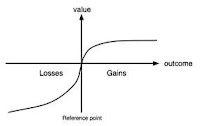Prospect Theory
According to Tversky and Kahneman, the prospect theory explores how an individual behaves when face with a risky situation. This theory suggests that when we are presented with choices, we consider the effects of each option relative to our present circumstances. Will we gain or lose relative to our current status quo? Definitely, we prefer gains because it is always better to receive money than to lose it. Hence, Kahneman and Tversky’s crucial contribution was the recognition that losses and gains are not weighed equally - for the same amount of gains and losses, losses hurt more than gains.
Below is the diagram showing the difference between the human perception on gains and losses. As shown, gains and losses relative to the current status quo are measured on the horizontal axis, and the perceived value of these gains and losses is presented on the vertical axis. As indicated, losses produce a greater change in value than equal size gains: losses hurt more than gains.
Below is the diagram showing the difference between the human perception on gains and losses. As shown, gains and losses relative to the current status quo are measured on the horizontal axis, and the perceived value of these gains and losses is presented on the vertical axis. As indicated, losses produce a greater change in value than equal size gains: losses hurt more than gains.

Similarly, many investors will not sell anything at a loss, as investors feel more comfortable taking a profit on an investment than selling an under-performing stock at a loss. Investors are more likely to take comfort from paper loss than establishing a real loss. This common investor behaviour is due to the prospect theory of magnifying the effect on losses. Or sometimes, people have high hopes that the price of the stock will recover and often focus on returning to a neutral position before exiting. This ‘get even’ attitude has probably wrought more destruction on investment portfolios than bear markets.
Hence, the understanding of prospect theory is extremely useful for an investment manager in obtaining a clearer understanding of shareholders’ perceptions towards investment. It acknowledges that investors focus on gains and losses of individual investments and not on the overall picture. Emphasis is also given more to losses than to gains, to the extent that losses are more painful after prior losses and subsequently lead to a greater risk of further irrational decisions.
Happy investing,
Pauline Yong
Hence, the understanding of prospect theory is extremely useful for an investment manager in obtaining a clearer understanding of shareholders’ perceptions towards investment. It acknowledges that investors focus on gains and losses of individual investments and not on the overall picture. Emphasis is also given more to losses than to gains, to the extent that losses are more painful after prior losses and subsequently lead to a greater risk of further irrational decisions.
Happy investing,
Pauline Yong

Comments
Post a Comment